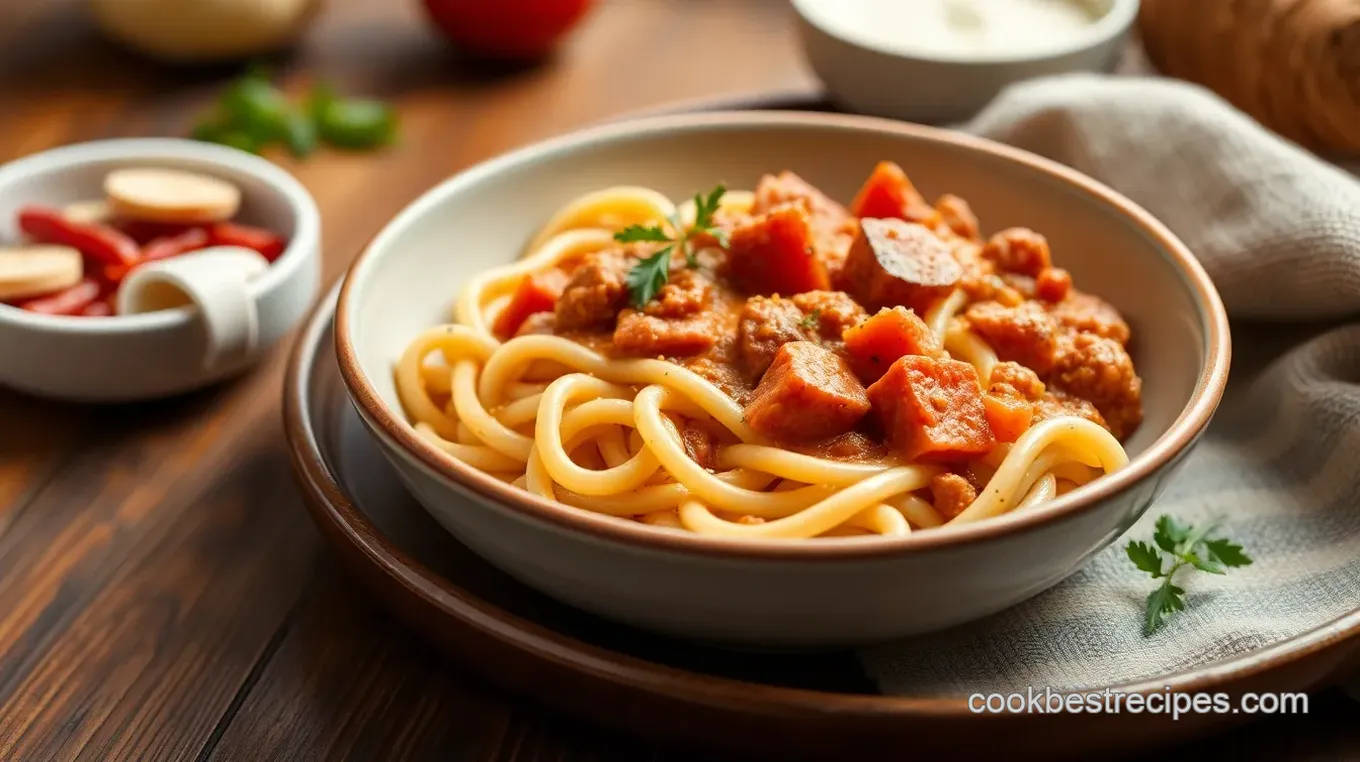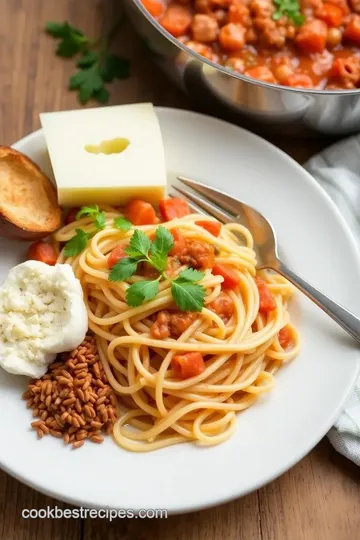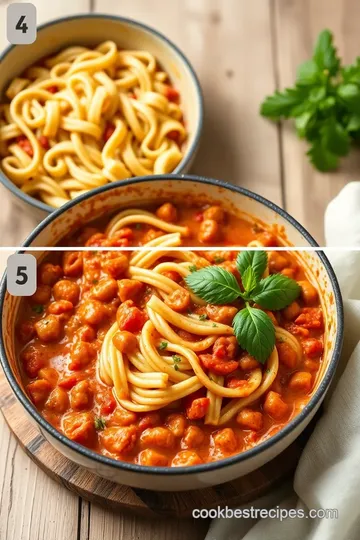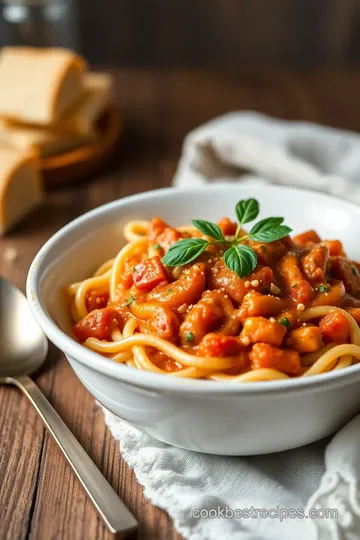Simmered Pasta e Fagioli with Hearty Flavor
Craving warmth? My family loves this Simmered Pasta e Fagioli with Hearty Flavor. It's a breeze to whip up, filling, and perfect for cozy nights! Enjoy tips!

- look into into Comfort with Simmered Pasta e Fagioli with Hearty Flavor
- What’s the Story Behind This Dish?
- Why You Should Try This Recipe
- Wrapping It Up
- Essential Ingredients Guide for Hearty Cooking
- Professional Cooking Method: Simmered Pasta e Fagioli with Hearty Flavor
- look into into the World of Simmered Pasta e Fagioli with Hearty Flavor
- Recipe Card
look into into Comfort with Simmered Pasta e Fagioli with Hearty Flavor
Ever had one of those chilly evenings when nothing sounded better than wrapping your hands around a warm bowl of soup? that was me last winter, huddled under a blanket, staring blankly into the fridge.
You know how it goes: half a can of beans, some limp veggies, and a lingering craving for something hearty.
That’s when i remembered my grandmother’s classic pasta e fagioli recipe . oh my gosh! i whipped up my version of this traditional italian bean soup, and let me tell you—it was pure magic! the rich and savory broth, combined with tender pasta and soft beans, created a warm hug in a bowl.
What’s the Story Behind This Dish?
Pasta e fagioli has roots that tie back to the rustic kitchens of italy. it’s a dish born from simple, humble ingredients—stuff you likely already have in your pantry.
Back in the day, it was a go-to for italians to stretch out meals when times were tough. today, it’s become a beloved comfort food recipe across the globe.
You’ll find it served at family gatherings, potlucks, and even on cozy winter nights just like my own.
One of the beautiful things about simmered pasta e fagioli with hearty flavor is how accessible it is. you don’t need to be a pro in the kitchen; if you can sauté and simmer, you’re golden.
Just a little prep (about 15 minutes) and a cook time of roughly 40 minutes, and voila—dinner’s done! and trust me, it yields a solid six servings.
Perfect for feeding the fam or even freezing some for those future weeknight emergencies.
Why You Should Try This Recipe
Let’s talk health benefits . this isn’t just any noodle soup; we’re talking nutrient-rich stews loaded with fiber from those beans and fiber-packed veggies.
You get a hefty dose of bean-based proteins , too, making this a great vegetarian option. plus, it fits beautifully into the mediterranean diet—hello, healthy eating!
What’s great about pasta e fagioli is its versatility. it’s made for everything from a cozy weeknight dinner to impressing guests at dinner parties.
Want to elevate it? pair it with a sprinkle of freshly grated parmesan or a drizzle of pesto. trust me, it’ll be a hit!
Don't forget that simple weeknight dinner aspect; having a one-pot pasta meal means less cleanup. Let's be real: who doesn’t love that?
Wrapping It Up
So, whether you’re diving head-first into that chilly weather or just craving a nice, warm bowl of comfort, simmered pasta e fagioli with hearty flavor is your answer.
Not only does it tickle your taste buds, but it’s also super filling and made with ingredients that are both wholesome and budget-friendly.
Plus, you get to be the culinary star of the evening, and trust me, it feels good to say, "i made this!"
Ready to get cooking? Let’s take a look at what you’ll need to whip up this delightful dish!

Essential Ingredients Guide for Hearty Cooking
When diving into the world of comfort food recipes , understanding your ingredients is key. they’re the magic behind every bowl of warmth, especially in dishes like simmered pasta e fagioli with hearty flavor .
Let’s break it down and make cooking feel a whole lot easier.
Premium Core Components
Alright, let’s chat about the must-haves in your kitchen. Here’s a quick breakdown:
-
Measurements : if you’re like me, you want simplicity. stick to 2 tablespoons olive oil (30 ml) or 1 can (400 g) of diced tomatoes .
It's good to measure precisely but don’t stress too much—just keep it close!
-
Quality Indicators : Fresh ingredients make everything better. When picking vegetables, go for vibrant colors. If herbs smell amazing, you’re golden. Canned beans should be free from cracks and dents.
-
Storage guidelines : keep olive oil in a cool, dark spot. dried beans can hang out in a pantry for up to a year , while opened cans should be used within 3-4 days .
-
Freshness Tips : Look for veggies that are firm and free from blemishes. If they look like they’ve had a rough life, it might be best to pass.
Signature Seasoning Blend
Now, seasoning is where the magic happens. Here’s what to keep in mind:
-
Essential Spice Combinations : A classic blend for our Italian bean soup includes oregano, thyme, and a pop of black pepper .
-
Herb Selections : Fresh is best, but dried works fine too. Tossing in basil at the last minute can elevate that savory broth meal vibe.
-
Flavor Enhancers : A splash of balsamic vinegar can really elevate the dish. Trust me; it’s a game changer!
-
Regional Variations : Want an extra kick? Go for red pepper flakes if you’re feeling spicy. You can even switch out the traditional pasta for gluten-free options.
Smart Substitutions
Got a pantry that’s a little bare? No worries! Here are some quick swaps that'll save the day:
-
Common Alternatives : If you’re out of cannellini beans, navy beans are just as good.
-
Dietary Modifications : Is your crew vegetarian? Ditch any meat broth and stick to vegetable broth instead.
-
Emergency Replacements : Running low on herbs? A pinch of Italian seasoning can stand in just fine.
-
Seasonal Options : In winter, root veggies like parsnips can add depth. While summer's all about fresh zucchini.
Kitchen Equipment Essentials
Alright, time to talk tools. Here’s what you really need:
-
Must-Have Tools : A big ol' pot like a Dutch oven is perfect for all those flavors to mingle.
-
Alternative Equipment : No Dutch oven? A large saucepan works just as well.
-
Preparation Tips : Invest in a good, sharp knife. It’ll make chopping veggies for your hearty pasta dishes a breeze.
-
Storage Solutions : After making that nutrient-rich stew , let it cool before you stash leftovers in airtight containers—easy peasy!
So, whether you're whipping up a pot of homemade pasta e fagioli or just looking to jazz up your weeknight dinners, starting off with great ingredients and tools will set you on the right track.
Trust me, you'll be on your way to creating comforting meals that will warm hearts and bring smiles to dinnertime.
Next up, let’s jump into those step-by-step instructions to bring your Simmered Pasta e Fagioli to life! Get ready to roll up your sleeves; it's gonna be delicious!
Professional Cooking Method: Simmered Pasta e Fagioli with Hearty Flavor
Cooking is like a dance, a beautiful blend of preparation, timing, and creativity. today, we're diving into the heart of italian cuisine with a classic: simmered pasta e fagioli with hearty flavor .
This dish isn’t just any soup; it’s a hug in a bowl, combining pasta, beans, and vegetables in a rich, savory broth.
Grab your apron, and let’s break it down, shall we?
Essential Preparation Steps
Mise en place: this fancy french term just means getting your stuff organized before you dive in. chop your veggies – that’s onion, carrots, and celery – and keep them ready.
It’s amazing how much smoother your cooking goes when you’ve got everything prepped.
Time management tips: your cooking time is like a race; you want to win without running out of breath. start by cooking your vegetables, and while they’re softening up, you can open that can of beans and gather your spices.
Multi-tasking is key, y'all!
Organization Strategies: Keep your workspace tidy. You’ll thank yourself when you’re not scrambling for that can opener. Plus, who doesn’t like a neat kitchen?
Safety Considerations: Keep a close eye on that knife, folks! Always cut away from yourself and be cautious of hot surfaces. Safety first, fun later!
Step-by-Step Process
Ready for the magic? Here’s how to whip up your Pasta e Fagioli :
-
Sauté vegetables: start by heating 2 tablespoons of olive oil over medium heat in a large dutch oven. toss in the diced onion, carrots, and celery, cooking until they’re nice and soft—about 5- 7 minutes .
Add minced garlic and cook for another minute.
-
Add herbs and seasoning: time to throw in 1 teaspoon of dried oregano and 1 teaspoon of dried thyme . stir these fragrant herbs in with a pinch of salt and pepper.
Just wait for that aroma to greet you!
-
Incorporate Beans and Tomatoes: Add 1 can of rinsed cannellini beans and 1 can of diced tomatoes . Stir it all up and feel the love.
-
Simmer the Broth: Pour in 4 cups of vegetable broth and crank up the heat until it boils. When it’s bubbling, reduce to low and let it simmer for 20 minutes .
-
Cook pasta: stir in 1 cup of small pasta and 1 tablespoon of balsamic vinegar . this is where the fun happens! let it simmer for an additional 10- 12 minutes until the pasta is tender and delicious.
-
Final Adjustments: Remove the bay leaf (it’s just there for flavor) and taste to adjust your seasoning. You might crave a touch more salt or a splash of pepper.
-
Serve: Ladle this goodness into bowls, sprinkle a little grated Parmesan (if you’re feeling it), and top with chopped parsley. Voilà!
Expert Techniques
Now, here’s where you get to elevate your game:
- Critical Steps Explained: Sautéing those veggies longer brings out a deeper flavor. Trust me, this step is a game-changer for your hearty pasta dishes .
- Quality Checkpoints: Make sure the pasta is al dente . You want it to have a bit of bite. Your texture and flavor will thank you later!
- Troubleshooting Tips: If your soup seems too thick, add a splash more broth. Too thin? A few more minutes with the heat turned up will help thicken it up.
Success Strategies
It’s all about avoiding those rookie mistakes!
- Common Mistakes to Avoid: Don’t skip the soaking step if you’re using dried beans. It can make or break your dish.
- Quality Assurance Tips: Taste as you go! Adjust the flavors, and don’t be afraid to make it your own.
- Perfect Results Guide: Remember that timing precision will lead to perfect pasta. Keep an eye on your clocks!
- Make-Ahead Options: This soup tastes even better the next day. Cook it up and let the flavors meld for a flavor explosion.
Food isn’t just about eating; it’s about connection, warmth, and nostalgia. This homemade pasta e fagioli is a staple that brings back memories of family dinners and chilly nights.
In our next section, we’ll dive into Additional Information that will help you explore more comfort food recipes and variations on this timeless dish. So stick around!

look into into the World of Simmered Pasta e Fagioli with Hearty Flavor
Oh my gosh, if there's one dish that screams comfort food, it's simmered pasta e fagioli ! this italian bean soup isn’t just a meal; it’s like a warm hug on a chilly night.
Whether you’re coming home after a long day or just in the mood for something comforting, this classic will hit the spot every single time.
Pro Tips & Secrets
Alright, let’s get real. Cooking pasta fagioli isn’t rocket science, but there are a few chef's secrets to amp up your game.
- Flavor Boost: Always, always sauté your veggies a bit longer until they’re golden. It brings out those savory notes that make your broth sing.
- Time-Saver: If you’ve got dried beans , soak them overnight! It’ll cut down your cooking time significantly.
- Taste Test: Don’t forget to adjust your seasonings—add more salt and pepper as you go! You want flavor in every bite.
- Presentation Perks: Top your Simmered Pasta e Fagioli with some freshly grated Parmesan and a sprinkle of parsley. It makes it look fancy, trust me!
Perfect Presentation
Let’s talk about making that bowl look Instagram-ready! A dash of color really makes a difference.
- Plating Techniques: Use a deep bowl for that rustic Italian feel. Ladle that soup right in the center.
- Garnish Ideas: Toss on some fresh herbs or a few croutons to give it that extra texture. I absolutely love adding basil sometimes.
- Color Combinations: Think about vibrant carrots against the beige broth; it just pops!
- Visual Appeal: A little drizzle of olive oil on top not only looks beautiful but adds a lovely sheen.
Storage & Make-Ahead
Now, I get it—life is busy. But that doesn’t mean you can’t enjoy a delicious homemade meal!
- Storage Guidelines: If you have leftovers (which you totally will since this recipe makes about 6 servings), cool it down and store in airtight containers in the fridge.
- Preservation Methods: You can freeze it too! Just make sure to leave a bit of space in the container for expansion.
- Reheating Instructions: When you reheat, add a splash of veggie broth if it’s too thick. Keeps it nice and soupy!
- Freshness Duration: It will last about 3 days in the fridge and up to 3 months in the freezer.
Creative Variations
Let’s spice up our Pasta e Fagioli recipe a bit! You don’t always have to stick to the traditional route.
- Flavor Adaptations: Add spicy Italian sausage if you’re feeling feisty. Or go totally vegetarian with extra sautéed vegetables like zucchini or bell peppers.
- Dietary Mods: For gluten-free pasta options , use your favorite gluten-free variety—no need to miss out on this goodness!
- Seasonal Twists: In summer, toss in some fresh tomatoes and basil. In autumn, why not add squash? A seasonal twist keeps it fresh.
- Regional Variations: Explore different beans like black beans or kidney beans for your own spin on this timeless dish.
Complete Nutrition Guide
Now let’s get into the nitty-gritty. We all love comfort food like this hearty pasta dish, but what’s it really packing?
- Calories and Nutrition: This Simmered Pasta e Fagioli comes in around 320 calories per serving. Pretty good for a filling dish, right?
- Health Benefits: You’ve got beans offering bean-based proteins , a ton of fiber from the veggies, and a nutrient-rich broth.
- Dietary Considerations: Vegetarian? Check. Trying to maintain a Mediterranean diet? Absolutely.
- Portion Guidance: Seriously—don’t feel guilty about enjoying a big bowl (or two!). It’s all good vibes here.
Expert FAQ Solutions
Got questions? I’ve got answers!
- Common Questions: A lot of folks asked, “Can I use canned beans instead of dried?”. Absolutely! Just rinse them and toss them right in.
- Troubleshooting Guide: If your soup thickens too much, just add more broth. Don’t sweat it; that just means you’re getting the hang of things!
- Success Tips: Trust your taste buds. You can always spice things up to your liking.
- Variations Explained: Remember, the beauty of this dish is how adaptable it is to your own tastes!
Take it from me, making simmered pasta e fagioli with hearty flavor is not just about filling your belly. it’s about enjoying the process, exploring flavors, and getting everyone around the table—but it’s also super easy! so go ahead and create your own cozy memories.
You got this, friend!

Simmered Pasta e Fagioli with Hearty Flavor Card

⚖️ Ingredients:
- 2 tablespoons olive oil
- 1 medium onion, diced
- 2 carrots, diced
- 2 celery stalks, diced
- 4 cloves garlic, minced
- 1 teaspoon dried oregano
- 1 teaspoon dried thyme
- 1 bay leaf
- Salt and black pepper to taste
- 1 can (14 oz) cannellini beans, drained and rinsed
- 1 can (14 oz) diced tomatoes with juices
- 4 cups vegetable broth
- 1 cup small pasta (such as ditalini or elbow)
- 1 tablespoon balsamic vinegar
- Grated Parmesan cheese (optional)
- Fresh parsley, chopped (optional)
🥄 Instructions:
- Step 1: Heat olive oil in a large pot over medium heat. Add diced onion, carrots, and celery; cook until softened (about 5-7 minutes). Stir in minced garlic; cook for 1 more minute.
- Step 2: Stir in oregano, thyme, bay leaf, salt, and pepper, cooking for another minute to release flavors.
- Step 3: Add rinsed cannellini beans and diced tomatoes to the pot; stir to combine.
- Step 4: Pour in vegetable broth; bring to a boil. Reduce heat to low and let it simmer for 20 minutes.
- Step 5: Stir in pasta and balsamic vinegar; continue simmering for an additional 10-12 minutes, or until pasta is al dente.
- Step 6: Remove bay leaf and adjust seasoning as necessary.
- Step 7: Ladle into bowls, garnish with cheese and parsley, and enjoy!
Previous Recipe: Quick & Easy: Cook Creamy Chicken Pasta in 30 Minutes!
Next Recipe: My Grandma's Amazing Sautéed Beef Hot Dog Sauce Recipe (40 Min)
